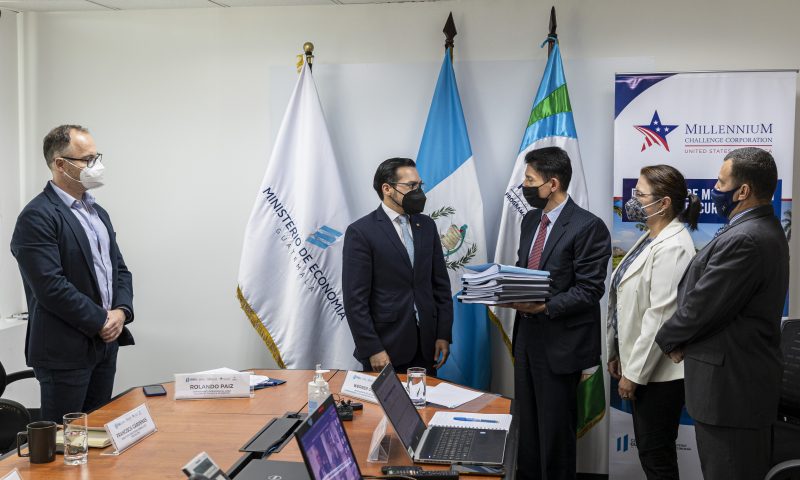
Pronacom
A meeting between MCC, the US Treasury Office of Technical Assistance (OTA), Homeland Security Investigations (HSI) and Guatemala’s Superintendency of Tax Administration (SAT) in July 2021 to officially deliver key documents in a customs fraud investigation.
With that in mind, the $28 million MCC-Guatemala Threshold Program worked in collaboration with the US Treasury Office of Technical Assistance to support Guatemala’s tax authority to undertake several process changes and implement new IT applications that deter and detect tax evasion while facilitating trade.
Importers pay a 12 percent Value Added Tax (VAT) on the value of the cargo and customs duties that vary depending on the type and origin of the merchandise. If an importer undervalues the cargo, they do not pay what they truly owe. The Guatemalan tax authority, SAT, regularly inspects about 10 percent of imports, but it can be difficult to detect undervaluation in cases where the importer has submitted falsified documents.
To tackle this problem, the program added a customs fraud investigator who worked with SAT to identify importers that had a pattern of valuations that appeared to be below market value. Through the Homeland Security Trade Transparency Unit, SAT and the project team obtained export declarations data and compared it with the import declarations and identified those that had different valuations for the same shipments. The next step in the investigation was to connect the Guatemalan tax authorities with authorities in Homeland Security in the United States to obtain the original invoices from the US suppliers. The investigation found several importers had submitted false invoices that consistently undervalued their imports by 25 to 40 percent.
If caught presenting a false declaration, importers must pay not only the taxes evaded, but they also lose any preferential tariff rates from trade agreements, such as CAFTA, and are subject to fines that result in them paying several times what they would have paid if they had properly declared the merchandise. Importers can also face criminal penalties if convicted of submitting falsified documents to the customs authorities.
Over the course of 4 years, one group of companies presented false invoices to avoid taxes and after accounting for the loss of preferential treatment and fines SAT will now seek to recover over $17 million in taxes and fines.
The goal of investigating tax evasion was to both prosecute these particular cases of fraud and to discourage other groups from engaging in similar acts. SAT now has the experience and plans to continue undertake these types of fraud investigations to detect falsified documents and ensure that everyone pays their fair share of taxes.
All told, the MCC – Guatemala Threshold Program has left Guatemala better able to secure the resources its government needs to meet its obligations to the Guatemalan people. Because of the efforts of the Guatemalan government, customs revenue increased by 28 percent between January and October 2021 compared to the same period in 2019.
MCC is proud of what our partnership with Guatemala has achieved through our work to improve the efficiencies of the customs and tax administration to increase revenues, enhance the quality of secondary education to prepare Guatemalans for the job market, and attract private investment to support infrastructure development.

